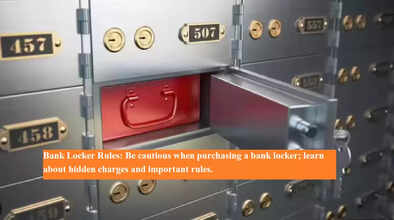Bank Locker Rules: Be cautious when purchasing a bank locker; learn about hidden charges and important rules.

Important Bank Locker Rules You Should Know Before Renting One
For many people, a bank locker is the safest place to store their valuable jewellery, legal papers, and important documents. However, before renting one, it’s important to understand the hidden costs, terms, and conditions associated with locker facilities. Banks often charge more than just the annual rent — there are registration fees, penalties for late payments, charges for extra visits, and even costs for lost keys. Knowing these details in advance can help you avoid unexpected expenses later.
Annual Locker Rent and Agreement Terms
Every bank sets its annual locker rent based on the locker’s size and the location of the branch. A locker in a metro city or a premium branch will usually cost more than one in a smaller town. The rent is generally collected in advance at the start of each financial year.
As per the Reserve Bank of India (RBI) guidelines, banks are required to provide customers with a signed copy of the locker agreement. This agreement contains all the terms and conditions, including the customer’s rights, responsibilities, and the bank’s liabilities. Reading this agreement carefully before signing is crucial to avoid disputes later.
Hidden and Additional Charges
While the annual rent is the most visible expense, customers should be aware of several additional charges linked to bank lockers:
-
Registration Fee: A one-time, non-refundable registration fee is charged at the time of allotment to cover documentation and administrative costs.
-
Extra Visit Fee: Banks generally allow a limited number of free locker visits each year. If you exceed that limit, you’ll be charged an additional fee for every extra visit.
-
Late Payment Penalty: If you fail to pay the annual rent on time, the bank imposes an overdue penalty.
-
Key Loss or Locker Breakage Fee: In case you lose your locker key, the bank may charge you for breaking open the locker and replacing the lock. For example, HDFC Bank specifies that this process must be done in the presence of an authorized vendor, a bank officer, and the customer to ensure transparency.
Fixed Deposit (Term Deposit) Requirement
Some banks may ask for a term deposit while allotting a locker. This deposit usually covers three years of locker rent and the cost of breaking open the locker if needed.
However, not all banks follow the same rule. For instance, State Bank of India (SBI) does not insist on a fixed deposit from long-standing customers or those who have maintained satisfactory account activity. To qualify for this exemption, an account must be fully KYC-compliant, active for at least three years, and maintain an average balance equal to two years’ rent. Employees and VIP customers are also typically exempt from this requirement.
Compensation for Loss or Damage
RBI guidelines clearly state that banks are responsible for compensating customers in certain circumstances. If valuables stored in a locker are lost or damaged due to the bank’s negligence, such as a fire, theft, building collapse, or unauthorized access, the bank is liable to pay compensation up to 100 times the annual locker rent.
However, if the loss occurs due to the customer’s negligence — for example, sharing keys with someone else — the bank will not be held responsible.
Essential Tips Before You Rent a Locker
Before signing a locker agreement, take time to read every clause carefully and ask your bank for a complete fee breakdown. Here are some key precautions to follow:
-
Always keep a copy of your locker agreement.
-
Make timely rent payments to avoid penalties.
-
Do not share your locker key or access details with anyone.
-
Visit the locker at least once a year to keep your account active.
-
In case of loss or theft, inform the bank immediately and lodge a formal complaint.
Final Words
Bank lockers are undoubtedly one of the safest ways to protect your valuable assets, but awareness is key. Understanding all associated charges, the agreement terms, and the bank’s responsibilities helps you make informed financial decisions.
So, before you rent a locker, read the fine print, clarify your doubts, and choose a locker size and plan that best fits your needs. A little caution today can save you from financial trouble tomorrow.

